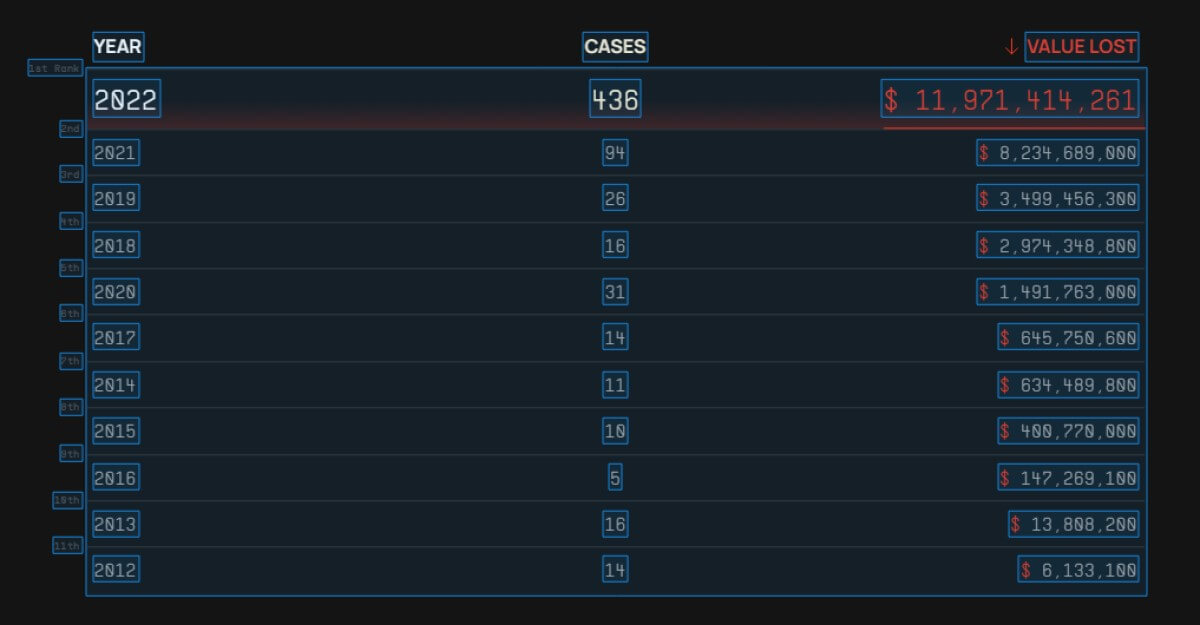
(© Chinnapong - stock.adobe.com)
BRATISLAVA, Slovakia — Cryptocurrency may be the hot commodity for investors in recent years, but a new study finds millions of dollars are going missing every single day thanks to crypto-related crime. Researchers say crypto crime hit an all-time high last year, with investors in digital currencies losing roughly $12 billion in 2022 alone. Unfortunately, the report warns that it'll only get worse in 2023.
A team at Chainplay notes that crypto investors worldwide have had over $30 billion stolen over the last decade. In 2022, there were 436 separate crypto crime incidents, more than four times the number reported in 2021 (94). Meanwhile, the amounts stolen during these crimes continues to rise, increasing by 46 percent between 2021 and 2022.
When you break down the nearly $12 billion stolen in 2022, that's $1.4 million in cryptocurrency disappearing every hour from people's accounts.

Summer is the season for crypto crime
The study finds June is a terrible time to be investing in crypto. More digital crimes that steal crypto have taken place in June than any other month over the last 10 years (76) with the exception of May (77). Digital crooks have gotten away with $5.7 billion during June crimes, representing nearly a fifth of all cryptocurrencies lost since 2012.
Although the study finds that investors in Turkey have lost the most money in crypto crimes ($2 billion), researchers say nearly $23 billion of the money stolen since 2012 comes from “undefined” sources.
How can this be? The answer is simple and also one of the reasons people like digital money. Cryptocurrencies like Bitcoin and Ethereum are digital, encrypted, and decentralized mediums of exchange.
“While Bitcoin isn’t anonymous, it is pseudonymous, meaning it can mask the identity of users. With the proper tools and techniques, it is possible to trace back the owner of transaction addresses,” according to cryptocurrency exchange company Crypto.com.
If you lose cryptocurrency, you likely won't get it back
The Chainplay team notes that centralized exchanges are the most likely targets of crypto thieves. These exchanges have lost over $13 billion to cyber thieves over the last decade. The most common tactic is a “rug pull” attack, which is a scam where a phony developer attracts investors but pulls out before the project is complete. This leaves the crypto investors with a worthless asset, literally “pulling the rug out” from under them.
According to the study's estimates, 2023 will be even worse for people dealing in cryptocurrencies worldwide. Investors could lose more than $16 billion this year, the study warns. That figure may reach $20 billion by 2025. Moreover, the team notes that authorities have only been able to recover one-fifth of the crypto ever lost.
Study methodology and limitations:
Data was scraped from the Crystal Hack and Scam Report 2022, which includes: entities, types of fraud, countries, amounts, currencies, and dates. Missing data in 2022 was subsidized by cases collected from the REKT Database. Data was analyzed, and insights were extracted using the data visualization software PowerBI. Missing historical data is possible due to the large number of scams and frauds in the past. Chainplay.gg researchers note that the presented data can be skewed due to the substitution of missing data.











I had bought Bitcoin pretty early 2011 and then had an issue which made me give up. After not opening my BitCoin wallet for nearly 4 years, I discovered my wallet's password didn't work, meaning my BitCoins were lost. The value had increased since then and made me revisit frequently. I managed to recover my wallet and all my bitcoins were there, trapped behind the password I used 9 years ago and could not remember. I contacted refundedtechrecovery through his email at ([email protected]) and he replied the same day, after a couple of emails back and forth he had cracked the encrypted password and I once again had access to my wallet. He only took his commission which was 15% as it was a fairly high value wallet but he was honest and disclosed everything from the start. I can recommend highly enough!
Crypto currency is becoming popular and the government haven't found a better way to control it, this made many fake exchange website to spring up and scam innocent people, i was once a victim and i lost totally all my bitcoins and ustd ,to the extent that i couldnt even get access to the account.I reached out for help ,but no one could provide any solution ,until i got to know a forensic expert on WWW. INTELALPHA , COM. he was able to recover only 60% of the funds.
The biggest issue with cryptocurrency is that it is unregulated, which is why different people can come up with different fake stories all the time, and it is unfortunate that platforms like Facebook and others only care about the money they make from them through ads. I saw an ad on Facebook for Chickenfastmining and fell into the scam, losing over $30,000. I reported it to Facebook, but they did nothing until I discovered deftrecoup . c o m from a crypto community; they retrieved approximately 95% of the total amount I lost.